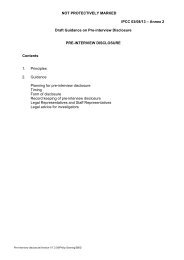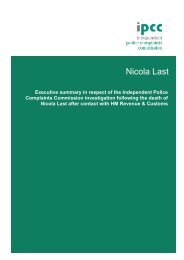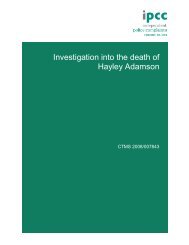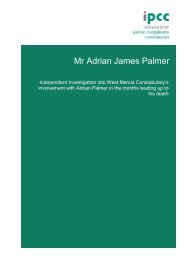Duggan_Final_Report_Foreword_29_Feb_2012 - Independent ...
Duggan_Final_Report_Foreword_29_Feb_2012 - Independent ...
Duggan_Final_Report_Foreword_29_Feb_2012 - Independent ...
Create successful ePaper yourself
Turn your PDF publications into a flip-book with our unique Google optimized e-Paper software.
REDACTED<br />
IPCC <strong>Final</strong> <strong>Report</strong> <strong>Duggan</strong> Family Complaint<br />
‘We are very sorry for the distress that has been caused to the family of Mark <strong>Duggan</strong>,<br />
especially because of the way in which his parents became aware of his death.’<br />
The police have also apologised directly to Mr <strong>Duggan</strong>’s parents during a visit by<br />
Commander Chishty to the family home on 2 September 2011.<br />
Both the police and the IPCC have policies and guidance in relation to family liaison when<br />
a death has occurred. The responsibility for delivering news of a death lies clearly with the<br />
police, and the guidance is that the news should be delivered promptly, to close family<br />
members.<br />
The IPCC took over family liaison on Friday 5 August and after a handover, one of the<br />
IPCC FLMs telephoned Ms Wilson. During the handover, the IPCC FLMs were told by the<br />
MPS that Mr <strong>Duggan</strong>’s parents did not want direct contact. The conversation with Ms<br />
Wilson focused on arrangements for formal identification of Mr <strong>Duggan</strong>’s body. The<br />
following morning, two IPCC FLMs accompanied approximately 14 members of Mr<br />
<strong>Duggan</strong>’s family during the formal identification.<br />
With the benefit of hindsight, the IPCC should have explored the family’s wishes in more<br />
depth with Ms Wilson, following the handover from the police FLOs, and not made the<br />
assumption that any wishes that may have been expressed by the family in relation to the<br />
police would automatically extend to the IPCC.<br />
In the aftermath of Mr <strong>Duggan</strong>’s death, his family were very confused and wanted to know<br />
what had happened to him. They did not understand the role of the IPCC, nor that the<br />
organisation was separate from the police. It would have greatly assisted them if a senior<br />
representative of the IPCC had visited the family home to introduce the organisation and<br />
explain its role, prior to the contact from the FLM.<br />
The IPCC responds to serious incidents using an on-call system, with a very small number<br />
of staff. As a result, the focus at the initial stages is on the investigation, particularly scene<br />
preservation, gathering forensic evidence and attending the police post-incident<br />
management meeting.<br />
We have now recognised the need to provide strategic oversight of some cases from the<br />
outset and we have established a new process, where the IPCC Director of Investigations<br />
and the IPCC Commissioner allocated to the case will ensure that immediate attention is<br />
given to the needs of the family where a death or serious injury has occurred. The needs<br />
of a bereaved family in such circumstances should be paramount.<br />
A community impact assessment will also be carried out within the first few hours and<br />
active engagement with community leaders will be sought. Family liaison and community<br />
engagement strategies will be approved by the IPCC Commissioner. These strategies will<br />
be reviewed regularly.<br />
When an independent IPCC investigation commences, both the police and the IPCC are<br />
keen to demonstrate the separation of roles and responsibilities and provide public<br />
REDACTED<br />
Page 5 of 23







